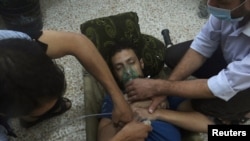The international medical humanitarian organization Doctors Without Borders (MSF) says three Syrian hospitals have received about 3,600 patients displaying symptoms of exposure to neurotoxic agents. This report comes just days after allegations that more than 1,000 people were killed in a chemical weapons attack allegedly carried out by the Syrian government.
Doctors Without Borders said Saturday it has learned that large numbers of patients arrived in the three Damascus hospitals with symptoms including convulsions, excess saliva and blurred vision, and that nearly 10 percent of those patients have died. Some of the medical and first aid workers treating the people brought in for treatment also found themselves contaminated.
Doctors Without Borders said the overall situation strongly indicates the local population suffered "mass exposure to a neurotoxic agent," adding, "This would constitute a violation of international humanitarian law, which absolutely prohibits the use of chemical and biological weapons."
Syria has denied all allegations that government forces used chemical weapons. State-controlled media have claimed rebel forces carried out nerve gas attacks this week, and the state news agency SANA reported that soldiers found evidence of this while searching tunnels in the capital city used by "armed terrorists."
In Washington, a White House official said the United States has a "range of options" if it decides to act against Syria's alleged use of chemical weapons. U.S. President Barack Obama met with his top national security advisers Saturday to discuss the Syrian situation.
Obama has previously expressed reluctance to intervene in Syria. U.S. defense officials, however, have recently said Washington is strengthening naval forces in the region.
Pentagon chief Chuck Hagel told reporters that Obama has asked the Defense Department for a range of options available if U.S. forces are ordered to take action against the Damascus government.
The U.S. and other world powers have been pushing for a United Nations-led investigation of the chemical weapons allegations, and a top U.N. official arrived in Damascus Saturday to push for access to the site where rockets loaded with poison gas were launched.
Russia has spoken out in defense of the regime of Syrian President Bashar al-Assad, but the Syrian ally joined China, the U.S., France, Britain and others in calling for a thorough investigation of the recent events in Syria.
Syrian opposition leaders and activists have released video of large numbers of bodies - many of them of young children - that bear no signs of physical violence of blood. Those pictures, and separate scenes from hospitals showing patients writhing in agony without apparent wounds - are said to be persuasive indications that they were victims of an attack that used nerve gas or some other deadly chemical agent.
Iran's new president, Hassan Rouhani, condemned the use of chemical weapons in Syria. State-controlled media in Tehran report he did not assess blame against either side in his comments on Saturday. Iran is Syria's ally, and its Foreign Ministry has previously said evidence indicates that Syrian rebels launched the attack.
Doctors Without Borders said Saturday it has learned that large numbers of patients arrived in the three Damascus hospitals with symptoms including convulsions, excess saliva and blurred vision, and that nearly 10 percent of those patients have died. Some of the medical and first aid workers treating the people brought in for treatment also found themselves contaminated.
Doctors Without Borders said the overall situation strongly indicates the local population suffered "mass exposure to a neurotoxic agent," adding, "This would constitute a violation of international humanitarian law, which absolutely prohibits the use of chemical and biological weapons."
Syria has denied all allegations that government forces used chemical weapons. State-controlled media have claimed rebel forces carried out nerve gas attacks this week, and the state news agency SANA reported that soldiers found evidence of this while searching tunnels in the capital city used by "armed terrorists."
In Washington, a White House official said the United States has a "range of options" if it decides to act against Syria's alleged use of chemical weapons. U.S. President Barack Obama met with his top national security advisers Saturday to discuss the Syrian situation.
Obama has previously expressed reluctance to intervene in Syria. U.S. defense officials, however, have recently said Washington is strengthening naval forces in the region.
Pentagon chief Chuck Hagel told reporters that Obama has asked the Defense Department for a range of options available if U.S. forces are ordered to take action against the Damascus government.
The U.S. and other world powers have been pushing for a United Nations-led investigation of the chemical weapons allegations, and a top U.N. official arrived in Damascus Saturday to push for access to the site where rockets loaded with poison gas were launched.
Russia has spoken out in defense of the regime of Syrian President Bashar al-Assad, but the Syrian ally joined China, the U.S., France, Britain and others in calling for a thorough investigation of the recent events in Syria.
Syrian opposition leaders and activists have released video of large numbers of bodies - many of them of young children - that bear no signs of physical violence of blood. Those pictures, and separate scenes from hospitals showing patients writhing in agony without apparent wounds - are said to be persuasive indications that they were victims of an attack that used nerve gas or some other deadly chemical agent.
Iran's new president, Hassan Rouhani, condemned the use of chemical weapons in Syria. State-controlled media in Tehran report he did not assess blame against either side in his comments on Saturday. Iran is Syria's ally, and its Foreign Ministry has previously said evidence indicates that Syrian rebels launched the attack.











